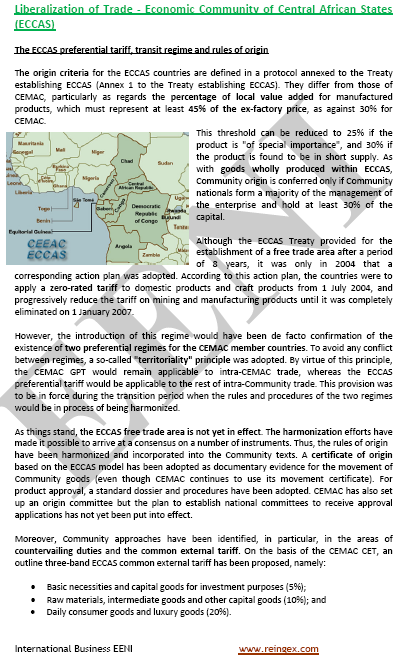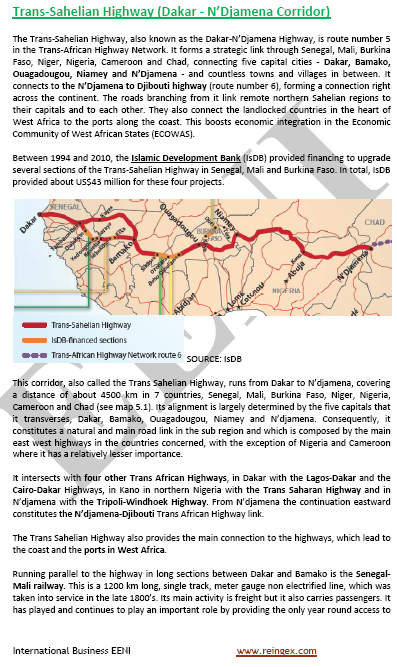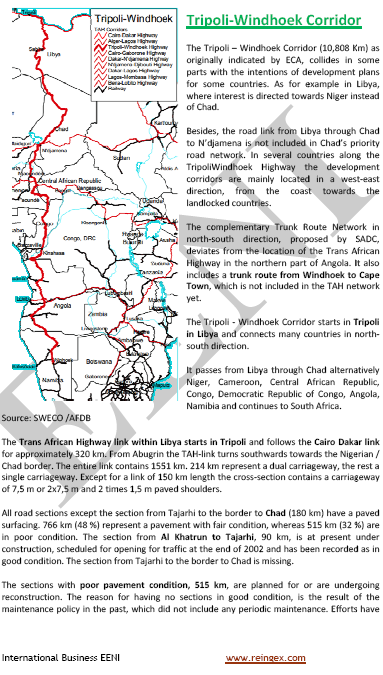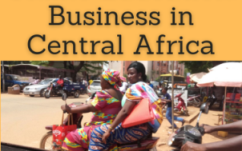Economic Community Central African (ECCAS)
Common Market, Economic Community of Central African States (ECCAS) Customs Union
The main objective of the Economic Community of Central African States (ECCCAS) is to promote regional economic cooperation and set-up a Central African Common Market.
The Economic Community of Central African States (ECCCAS) Member States are Angola, Burundi, Cameroon, Central African Republic, Chad, Democratic Republic of the Congo, Equatorial Guinea, Gabon, Republic of the Congo, Rwanda, and São Tomé and Príncipe.
Neither the customs union nor the Free Trade Area of ECCAS is still in operation.


- Introduction to the Economic Community of Central African States (ECCAS /CEEAC)
- History of the Economic Community of Central African States
- Structure of the Economic Community
- Aims of the Economic Community of Central African States
- Main institutions of the Economic Community of Central African States
- Areas of intervention of ECCAS
- Trade liberalization
- Preferential tariff, transit regime and Rules of Origin of the Economic Community of Central African States
- Customs Union
- Customs Duties elimination
- External common customs tariff
- Non-tariff Barriers to intra-community trade
- Most-favoured-nation treatment
- Re-export of goods and intra-community transit
- Cooperation on monetary, financial, and payments fields
- Cooperation on agriculture and food
- Cooperation on infrastructure and equipment, transportation, and communications
- Specialized agencies of ECCAS
- Regional Commission for Fisheries of the Gulf of Guinea
- Commission of Central African Forests
- Power Pool of Central Africa
- Projects and programs
- Integration of Indigenous Peoples
- Responsible Management of Protected Areas
- Sustainable development for integration
- Protect our wildlife against poaching
- Anti poaching and illegal ivory trade
- Integration through agriculture
- Green economic development in Central Africa
- Protect the wildlife against poaching
- Integrated Water Resources Management
- Doing Business in Central African Countries (Economic affairs, International Trade...)
Sample - Economic Community of Central African States (ECCAS)

The educational aims of the Subject “Economic Community of Central African States (ECCAS)” are:
- To understand the goals, functions, and specialized agencies of ECCAS
- To assess the benefits for the member countries of ECCAS and cooperation areas
- To learn about socio-economic development of the Central African Countries
- To research economic and trade integration process between ECCAS member countries
- To explore the impact of illegal trade of ivory and the green economic development in Central Africa

The Subject “Economic Community of Central African States” is included within the curriculum of the following academic programs at EENI Global Business School:
Doctorate in African Business.

Master in Business in Africa, International Business.


Languages:  or
or  Communauté Économique des États de l’Afrique centrale CEEAC
Communauté Économique des États de l’Afrique centrale CEEAC  Comunidad Económica Estados África Central CEEAC
Comunidad Económica Estados África Central CEEAC  Comunidade Económica Estados da África Central CEEAC.
Comunidade Económica Estados da África Central CEEAC.
Credits of the Subject “Economic Community of Central African States (ECCAS)”: 1 
- Rwanda was a founding member but left ECCAS in 2007 to join the East African Community (EAC)
- In 1983 was founded ECCAS by the members of the Customs and Economic Union of Central Africa and the Economic Community of the Great Lakes States (Burundi, Rwanda, Zaire, and Congo) as well as São Tomé and Príncipe
- The Economic Community of Central African States (ECCAS) has been inactive from 1992 to 1998
- The Economic Community of Central African States has overlapping countries with the Central African Economic and Monetary Community (CEMAC): Chad, the Central African Republic, Congo-Brazzaville, Gabon, Equatorial Guinea, and São Tomé and Príncipe
- The official languages of ECCAS are French and Portuguese
- The population of ECCAS countries: 145 million inhabitants
- The headquarters of the Central African Economic and Monetary Community (ECCAS): Libreville (Gabon)
- On 24 January 2003, the EU concluded a financial agreement with ECCAS and CEMAC conditioned to peace and security strengthening in Central Africa
All ECCAS countries have Christian majorities, except Chad, which has a Muslim majority.
ECCAS belongs to the Central African Economic Area.
Main Trans-African Transport Corridors in ECCAS region.
- Tripoli-Windhoek Logistics Corridor
- Trans-Sahelian Highway
- Beira-Lobito Logistics Corridor
- Lagos-Mombasa
Largest ports in ECCAS:
- Port of Douala (Cameroon)
- Port of Lobito and Port of Luanda (Angola)
- Port of Pointe Noire (Congo)
- Port of Malabo (Equatorial Guinea)
- Port of Libreville


(c) EENI Global Business School (1995-2025)
Top of this page









 WhatsApp
WhatsApp
